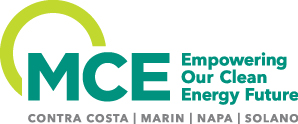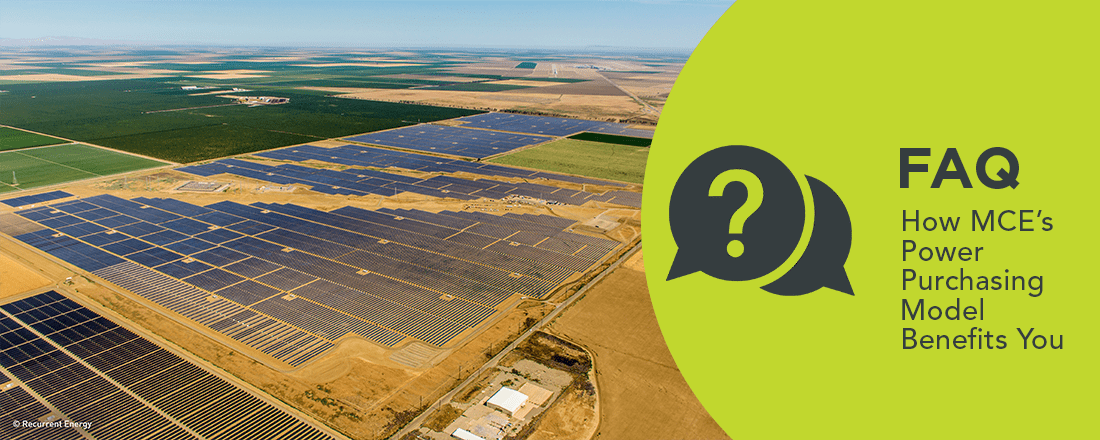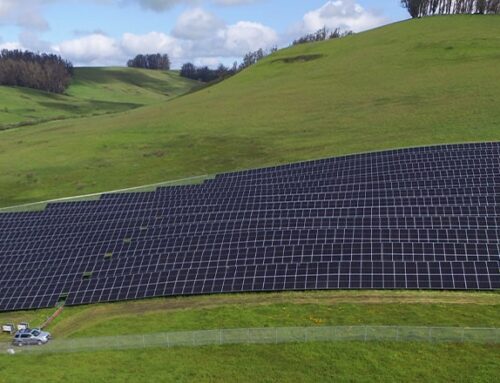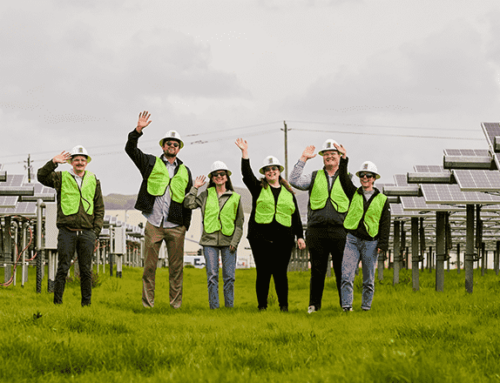As your local, not-for-profit, public electricity provider, MCE purchases power and provides customer programs to benefit you. From choosing more renewable energy to fostering community reinvestment, the way MCE purchases power provides more than just clean energy.
Local Renewable Energy Projects
MCE’s Feed-In Tariff Plus (FIT Plus) Program incentivizes the development of small-scale renewable energy projects (like solar, wind, or biomass that are 1 to 5 megawatts) within our service area, contributing to a carbon-free future. That’s why MCE offers one of the most competitively priced FIT programs in California. The FIT Plus Program also includes requirements for union labor, prevailing wage, 50% local hire for project workers, and pollinator-friendly ground cover throughout the project site. These additional program requirements help MCE deepen our investment in the clean energy economy and foster local biodiversity. To date, MCE has helped build 49 megawatts of new renewable projects in our service area. All local projects over 1 megawatt were built with union labor.
Last year MCE announced our newest community programs, Community Solar Connection and Green Access. These programs offer qualifying customers living in a designated disadvantaged community access to 100% renewable energy and a 20% discount on their electricity bills for up to 20 years. Both programs will be supported by the development of an additional 5.92 megawatts of new local clean energy capacity in partnership with community-based organizations.
Biomass Principles
MCE’s Principles on Responsible Biomass Electricity Development ensure that the biomass facilities we contract with have the appropriate permits for the California Environmental Quality Act and local air district, use the best available control technology, and support sustainable forest management and wildfire reduction strategies. We also prioritize contracts that:
- Use a source of organic material that has been diverted from landfill,
- Offer carbon neutral resources and adaptations, and
- Proactively minimize local air quality impacts, both from the facility and from the transportation of fuel from its source to the facility.
In addition, MCE will not procure biomass electricity from resources located in vulnerable communities defined by CalEPA’s most current CalEnviroScreen map tool at the time of contract execution. Whenever possible, MCE strives to procure biomass electricity from facilities that are not located in populated areas.
Equity Metrics
MCE’s 2021 Open Season solicitation was the first year that suppliers were encouraged to consider community benefits and equity metrics when submitting offers. Here are some of the optional metrics that MCE solicited in 2021 and again in 2022:
- Support for educational programs, environmental justice initiatives, and workforce development and training initiatives,
- Participation of contractors, subcontractors, or businesses owned by disabled veterans that are in a designated disadvantaged community, or that employ workers living in a designated disadvantaged community, and
- Use of components and materials manufactured or assembled in the United States.
In late 2020, when issues related to the use of forced labor for solar equipment production in Xinjiang, China were reported, MCE incorporated new language into our Power Purchase Agreement (PPA) term sheets and contracts that prohibits MCE from accepting proposals for facilities that rely on equipment or resources built with forced labor. This language was incorporated into MCE’s 2021 Open Season, Green Access, and Community Solar Connection PPAs and will continue to be an MCE procurement requirement.
Supplier Diversity
MCE’s annual Supplier Diversity Report showcases our investment in small and diverse businesses. MCE’s report includes information about its use of suppliers certified by the CPUC Supplier Clearinghouse, a certification program that is solely based on characteristics of the owner(s) of the company. Unfortunately, as noted in the report, MCE spends 92% of its budget on electricity supply, and less than half of one percent of the certified companies in the CPUC Supplier Clearinghouse provide electricity supply. Almost all companies that supply electricity generation to California utilities either do not meet the CPUC’s diversity characteristics, or they have not become certified. MCE is investing in workforce development that creates more diversity in the energy sector as a means for fostering future diversity in ownership.
MCE’s supplier diversity efforts include the following:
- Hosting annual workshops to support local businesses in the process of becoming certified through the CPUC Supplier Clearinghouse,
- Participating in the CPUC Supplier Diversity en bancs and business expos,
- Engaging with local and diverse Chambers of Commerce and community-based organizations across its service area,
- Offering a portfolio of capacity building programs for small and local businesses, and
- Encouraging submissions from diverse suppliers to MCE’s competitive solicitations.
Sustainable Workforce Policy
Through workforce training and pre–apprenticeship programs, MCE also supports sustained and fairly compensated local job opportunities in the energy industry. MCE’s workforce programs develop a longer–term pipeline of local green job opportunities for community members. These workforce development opportunities focus on public–private partnerships to construct local renewable energy projects and install energy efficiency retrofits, electric vehicle charging stations, energy storage installations, and low–income residential solar.
In early 2022, MCE updated our Sustainable Workforce Guidelines to create a more detailed plan for how we implement our Sustainable Workforce and Diversity Policy, further demonstrating our commitment to procuring resources that benefit our customers, our planet, and our future.






